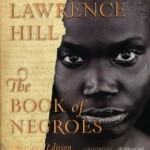 Canada has a reputation in America as being a traditional safe haven. Slaves, draft dodgers, whatever, Canada is known as the land of polite refuge. E5 is here to blow that up. Aminata arrives in Nova Scotia pregnant, alone and broke. The British promises of adequate support have been derailed by her delayed departure and the age old trap of good intentions. The black citizens are hungry and desperate. Aminata finds her inhospitable new home isn’t even free of slavery. When you’ll do anything for food indentured servitude seems like a good plan. Chekura is once again among the missing so Aminata sets about rebuilding her life.
Canada has a reputation in America as being a traditional safe haven. Slaves, draft dodgers, whatever, Canada is known as the land of polite refuge. E5 is here to blow that up. Aminata arrives in Nova Scotia pregnant, alone and broke. The British promises of adequate support have been derailed by her delayed departure and the age old trap of good intentions. The black citizens are hungry and desperate. Aminata finds her inhospitable new home isn’t even free of slavery. When you’ll do anything for food indentured servitude seems like a good plan. Chekura is once again among the missing so Aminata sets about rebuilding her life.
No longer Moslem, she is befriended by a Christian preacher. The Book of Negroestreats religion oddly. Aminata was raised in one faith, which the slave traders demanded she abandon. Later, she is sold to a Jewish couple who don’t appear to have converted her. Finally she ends up surrounded by Christians, where we see Aminata attend church. There seems no difference or slight difference between the faiths. The only time Aminata refers to her Moslem upbringing is discussing the relationship options of enslaved couples. (She marries Chekura because her parents wouldn’t have approved of shacking up.) In E5 and E6 the community’s Christianity is the source of their strength. The church is where they support each other and make decisions. The hymnal is how they offer guidance. It’s all very One God Different Paths but not in a clear way.
Anyway, so Nova Scotia is full of Good People who are tolerating the black refugees because they see little choice. The land is inhospitable for farming, not that the British followed through on their promises of free property. Lynching is common. Aminata uses her skills to write letters of appeal and protest back to England, which leads to employment at the town paper. There she discovers the reality behind Canada’s promise. A white woman screaming about justice calls for the destruction of everyone. You know Chekura’s going to be right in the middle of all that.
Chekura has joined Aminata in Nova Scotia. He continues to irritate me. Back in New York, Aminata’s friends had been shocked to discover that she married the man who helped enslave her. They, unlike Aminata, don’t see his kindness as redemptive or his enslavement as proof he wasn’t a true collaborator. As their situation in Nova Scotia becomes untenable, Chekura’s guilt over their past comes to the front. Against the wishes of the Canadians, Aminata has arranged for the British to take them all to Sierra Leone. She reflects on the mixed messages of life in Canada. The whites don’t want them to stay and they don’t want them to go. Why can’t Aminata and her fellows be some of the Good Ones who labor for free, die at their whim, and starve while they eat?
Reunited with her British friend, John Clarkson, Aminata successfully boards the boat for home. Some were born in Africa, some in North America, but all of them are hoping to finally gain true freedom. Once again the British make promises they can’t keep and once again the refugees have limited choices. Chekura grows increasingly agitated, wanting to remain in Canada. He can’t share Aminata’s dream of return without dealing with his own past. Chekura’s efforts to make up for his sins through love and loyalty to his wife are now threatened. Aminata has lost too much and too many to be dissuaded. They’re going to Africa if it kills them.
*This post originally appeared at Love In The Margins.













